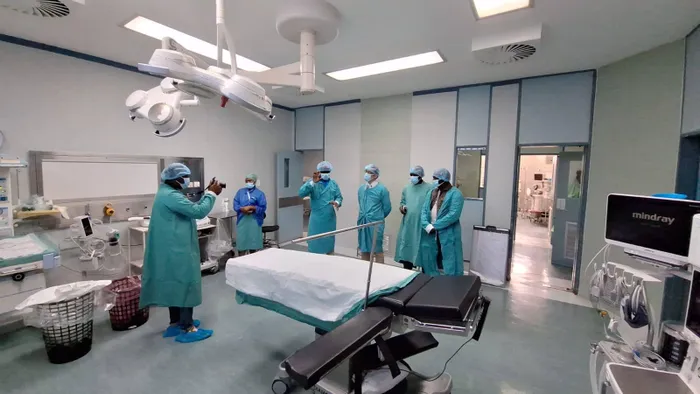Health Funders Association challenges National Health Insurance Act in court
LITIGATION

The Health Funders Association (HFA), which represents 21 medical schemes and 3 administrators, in a media briefing on Thursday said that it launched a legal challenge against key aspects of the National Health Insurance (NHI) Act.
Image: SITHUNYELWE
The Health Funders Association (HFA), representing 21 medical schemes and three administrators, announced a legal challenge against critical components of the National Health Insurance (NHI) Act during a media briefing on Thursday.
HFA's CEO, Thoneshan Naidoo, said the organisation supported universal health coverage (UHC) but criticised the NHI Act as unaffordable, unworkable, and unconstitutional.
Key Concerns with the NHI Act
The NHI Act establishes a centralised, state-controlled fund that consolidates all healthcare financing, prohibiting medical schemes from covering services reimbursable by the NHI.
Naidoo argued that this restriction infringes on citizens' constitutional rights to choose how they access and fund healthcare beyond state provisions.
"South Africa deserves an equitable, high-quality healthcare system," Naidoo said. "While we support this vision, the NHI Act is fiscally unfeasible and threatens the stability of both the economy and the healthcare sector."
Economic modelling
HFA commissioned Genesis Analytics (Genesis), an independent economic consultancy with experience in over 115 countries, to build a financial and economic model to test the viability of NHI. “It was also asked to compare NHI, including its anticipated prohibition of most forms of private health insurance, to systems in other countries such as South Africa’s middle-income peers. The report, released on Thursday, unequivocally demonstrates that the NHI Act requires unsustainable tax increases while reducing healthcare access for medical scheme members.”
For NHI to fund a level of care equivalent to what medical scheme members currently receive, as government has indicated is the intention, the Genesis model shows that personal income tax would need to increase by 2.2 times (a 115% increase in tax) from the current average rate of 21% to an average of 46% of income.
Naidoo said this would push marginal tax rates in the lowest income bracket from 18% to 41%, and in the highest bracket from 45% to 68%. “While VAT is not mentioned in the NHI Act as a means to raise funding for NHI, HFA has estimated for illustrative purposes that VAT would need to be increased from 15% to 36%, which is completely unrealistic. The Genesis model also considered a scenario of pooling existing healthcare expenditure (private and public). To enable this, personal income tax would need to increase by 1.5 times its current rate (47% increase in tax), i.e., from its average of 21% to 31%. At the same time, medical scheme members would face a 43% reduction in the level of healthcare services relative to what they currently receive.”
Naidoo said, “What’s more, the proposed model offers no guarantee of improved outcomes, while restricting the mechanisms that currently drive quality and innovation in healthcare.”
HFA advocates for a more inclusive, hybrid funding model that incorporates medical schemes in NHI.
"We believe such a model would expand access to care while protecting the rights of all South Africans,” said Naidoo.
Destabilise economy
Naidoo also warned the steep tax increases required to fund the NHI will reduce disposable income, curb consumer spending across all sectors of the economy, and may well trigger an exodus of high-income taxpayers.
“At the same time, destabilising the private healthcare sector will deter investment, put jobs at risk, and slow GDP growth in a sector that contributes over 4.3% to South Africa’s GDP. The economic analysis also shows that the monopsony purchasing power centralised in the NHI Fund could reduce the availability of medicines and health services, thereby diminishing access to care,” he said.
Naidoo reiterated that this legal challenge is not their preferred course, but it is a necessary one to protect the economy and the future of healthcare for all South Africans.
“The NHI Act will reduce access to healthcare for South Africa’s 9.1 million medical scheme members as it will not be possible for NHI to provide the same level of access and quality that medical schemes fund," he said.
BUSINESS REPORT

The Health Funders Association (HFA), which represents 21 medical schemes and 3 administrators, in a media briefing on Thursday said that it launched a legal challenge against key aspects of the National Health Insurance (NHI) Act.
Image: SITHUNYELWE